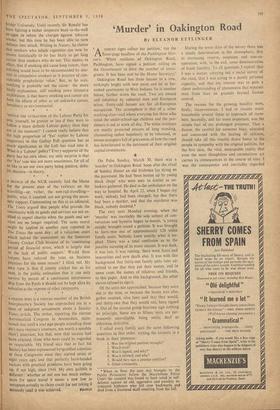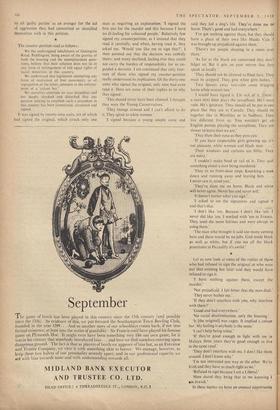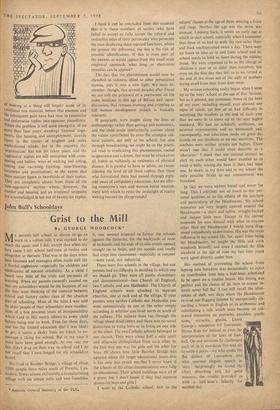`Murder' in Oakington Road
By ELEANOR ETTLINGER ASTREET signs colour bar petition,' ran the front-page headline of the Paddington Mer- cury, 'White residents of Oakington Road, Paddington, have signed a petition calling on the Government to limit the number of immi- grants. It has been sent to the Home Secretary.'
Oakington Road has three houses in a row, strikingly bright with new paint and let as fur- nished apartments to West Indians. So is another house, farther down the road. Two are owned and inhabited by coloured men and European wives. Forty-odd houses are for all-European occupation. The atmosphere is that of a sober working-class road where everyon,e but those who mind the under-school-age children and the pen- sioners is out at work all day. The white residents are mostly protected tenants of long standing, clamouring rather hopelessly to be rehoused, or owner-occupiers full of grievances of how the road has deteriorated to the detriment of their original capital investments.
On Palm Sunday, March 30, there was a 'murder' in Oakington Road. Soon after the ritual of Sunday dinner an old Irishman lay dying on the payement. He had 'been beaten up by young black chaps' who were seen to scatter as on- lookers gathered. He died in the ambulance on the way to hospital. By April 22, when I began my work, nobody had been charged; but that there had been a murder, and that the murderer was black, nobody doubted.* The very next Monday evening, when the 'murder' was inevitably the sole subject of con- versation and hysteria began to mount, 'a young couple' brought round a petition. It was brought to forty-two out of approximately 120 white family units. Nobody knew exactly what it im- plied. There was a total confusion as to the possible meaning of its many clauses. It was dark, it was late, it was raining; there were fears and insecurities and now death also. It was with this background that thirty-one family units later ad- mitted to me that they put their names, and in some cases the names of relatives and friends, to this paper. And to this background, the other eleven refused to sign it.
Of the units not approached, because they were out at the time, or because the house was alto- gether omitted, nine later said that they would, and thirty-two that they would not, have signed it. Out of the second group fourteen sign nothing on principle. Some ten to fifteen units are per- manently unavailable, being senile, deaf or otherwise defective.
I asked every family unit the same following questions in that order, writing the answers in a book in their presence : 1. Was the original petition brought?
2. Was it read?
3. Was it signed, and why?
4. Was it refused, and why?
5. Would they sign a counter-petition?
6. Other comments.
* When in June the case was brought by the Public Prosecutor before the Marylebone Police Court the accused was found to have acted in self- defence against an old, aggressive and possibly in- toxicated Irishman who fell over backwards and died from a fractured skull resulting from the fall. During the seven days of the survey there was a steady deterioration in the atmosphere; first to increasing reserve, suspicion and non-co- operation, with, in the end, some demonstration of frank hostility. To all questions I replied that I was a doctor, carrying out a social survey of the road, that I was acting in a purely personal capacity, and that my interest was to gain a closer understanding of phenomena that separate man from man on grounds beyond human control.
The reasons for the growing hostility were, firstly, inconvenience. I had to trouble many households several times to approach all mem- bers. Secondly, and far more important, was the simple fact of my prolonged presence. That a doctor, the symbol for someone busy, educated and connected with the healing of sickness, should take all this trouble drove home to the people in sympathy with the original petition, for the first time, the vital, inescapable reality that even the most thoughtless and unconscious act carries its consequences in the course of time. I was the consequence and inevitably regarded by all 'guilty parties' as an avenger for the act of aggression they had committed or identified themselves with in this petition.
The counter-petition read as follows :
We 'the undersigned inhabitants of Oakington Road, Paddington, being aware of the gravity of both the housing and the unemploythent ques- tions, believe that their solution does not lie in any form of infringement of full equal rights of racial minorities in this country.
We understand that legislation attempting any form of restriction of free movement, or of segregation of the latter, amounts to the enforce- ment of a 'colour bar.'
We ourselves entertain no race prejudices and are deeply shocked and disturbed that any petition seeking to establish such a precedent in this country has been formulated, circulated and signed.
It was signed by twenty-nine units, ten of which had signed the original, which struck only one man as requiring an explanation; 'I signed the first one for the murder and this because I have no ill-feeling for coloured people.' Relatively few signed my counterpetition, as I insisted that they read it carefully, and when, having read it, they asked me, 'Would you like me to sign this?', I then pointed out that the decision was entirely theirs; and many declined, feeling.that they could not carry the burden of responsibility for so un- guided a decision. 1 am convinced that only four- teen of those who signed my counter-petition really understood its implication. Of the thirty-one units who signed the original, only nine had even read it. Here are some of their replies as to why they signed : 'This should never have been allowed. I thought they were the Young Conservatives.'
'They lounge around and I can't afford to do it. They speak to white women.'
'I signed because a young couple came and said they led a dog's life. They've done me no harm. Thete's good and bad everywhere.'
'I've got nothing against them, but they should have a place of their own like Maida Vale. I was brought up prejudiced againgt them.'
'There's ten people sleeping in a room over there.'
'As far as the black • are concerned they don't fidget us. But it gets on your nerves that they speak so loudly.'
'They should not be allowed to flood here. They must be stopped. They give white girls babies.'
'Two louses away taxi-cabs come bringing home white women late.'
'I would have signed it. I'm sick of it. There.; a man next door plays the saxophone. He's most rude. He's ignorant. They should all be put in one place like they are in Canada. They should be together like in Wembley or in Sudbury. They live different, from us. You wouldn't get an English person playing the saxophone. They are slower to learn than we are.'
'They blow their nose as they pass you.'
'If you have respectable girls .growing up, it's not.pleasant, white women and black men. . .
'Their windows and curtains are filthy. "1-11,,.y are noisy.'
1 couldn't make head or tail of it. They said something about a man being murdered.'
'They sit on front-door steps. Knocking a man down and running away and leaving, him. . . I never saw it, mind you.'
'They've done me no harm. Black and white will never agree. Never has and never will.'
'It doesn't matter what you sign.'
'I asked to see the signatures and signed !I and that's that.'
'I don't like 'em. Because I don't like 'em. I never did like 'em. I worked with 'em in France. They used the same latrines and were abrupt in using them.'
'The man who brought it said too many cooling here and there would be no jobs. God made black as well as white, but if you see all the black prostitutes in Piccadilly it's awful.'
Let us now look at some of the replies of thpse who had refused to sign the original or who were out that evening but later said they would have refused to sign it.
'I have nothing against them, except the murder.'
'Not prejudiced. I felt bitter that the man died.' 'They never bother me.'
'It' they don't interfere with you, why interfere with them?'
'Good and bad everywhere.'
'No racial disCrimination, only the housing.' 'It [the original] was cagey. It implied a colour bar. My feeling is anybody is the same.'
. can't help being white.'
'If they're good enough to fight with me in Malaya three years they're good enough to live in the same road: 'They don't interfere with me. I don't like them around. I don't know why.'
'I'm not interested one way or the other. We're Irish and they have as much right as we.'
'Refused to sign because I am a Liberal.'
'How dared they bring that to me knowing I am Jewish.'
In these replies we have an unusual opportunity of looking at a thing still largely made of its emotional raw material, before that emotion and the subsequent guilt have had time to rationalise and systematise replies into apparent plausibility. Where the problem is still quite young (i.e. of no more than four years' standing) 'rational' argu- ments, like housing and unemployment, already figure in the replies of brighter and more sophisticated minds; but in the majority this organisation' has not yet taken place, and the aggressive' replies are still concerned with cross- mating and babies, ways of walking and sitting, talking and excreting (spitting, nose-blowing, lavatories and prostitution), to the extent that these matters figure in two-thirds of their replies. They are completely absent from those of the non-aggressive' section—where, however, the Murder and housing and an irrational antipathy are acknowledged in ten out of twenty-six replies. I think it can be concluded from this material that it is those members of society who have failed to accept or fully accept the natural and instinctive sides of their personality who persecute the man displaying these rejected functions, where the greater the difference, the less is the risk of possible identification. If this is even part of the answer, as would appear from this small-scale empirical approach, what long- or short-term remedies can be applied?
The fact that the phenomenon would now be classified as sickness, allied to other persecution manias, puts it into a new light. We must re- member, though, that several decades after Freud we are still the prisoners of a puritanism all the more insidious in this age of Bikinis and 'open' discussion, that remains stunting and crippling to full human development (which is basically tolerant).
If geography were taught along the lines of anthropology rather than geology and economics, and the child made intellectually curious about the values contributed by even the strangest cul- tural pattern, not only at his school, but also through broadcasting, we might be on the practi- cal road to eradicating this phenomenon, rooted in ignorance and sickness, that must be attacked on all fronts as ruthlessly as epidemics of physical disease. It is painful to have to admit, on recon- sidering the level of all these replies, that those who formulated them had passed through eight- odd years of compulsory education. Are we offer- ing tomorrow's men and women better nourish- ment with which to resist the onslaught of reality waiting beyond the playgrounds?




































 Previous page
Previous page